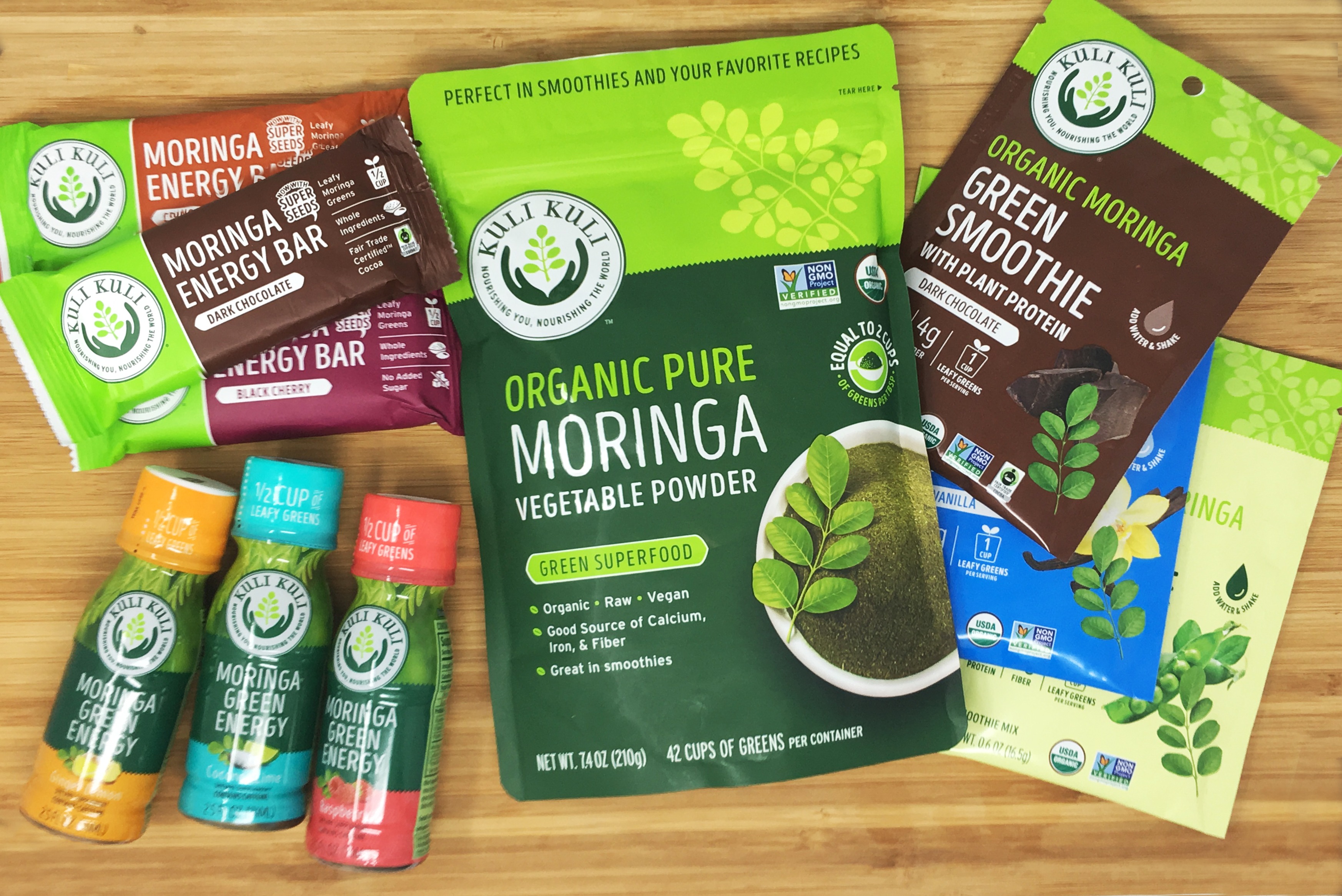Moringa is going mainstream. The super green that’s more nutritious than kale is now in more than 3% of US households as consumers are feeling benefits such as antiinflammation, sugar level regulation and even arthritis relief. In other cultures, moringa leaves have been a staple in medicine, known for their antioxidants and source of vitamins and minerals.
Driving the US market for the plant is Kuli Kuli, a startup out of Oakland, California that was founded by Lisa Curtis, an ex-Peace Corps volunteer who discovered its benefits while in a small village in Niger. Experiencing fatigue living on mostly rice and millet as a vegetarian, women at the local community health center recommended moringa which she mixed with a popular peanut snack called kuli-kuli. After feeling a lot better, she then started promoting Moringa to the local villagers and later started working with them to sell a portion of each harvest to the US.
(Bringing prosperity to moringa farmers is a key mission for Kuli Kuli – find out more in our first ever post about Kuli Kuli back in 2014 here.)
Kuli Kuli, which sells moringa-based products such as powders and snack bars, already accounts for over 50% of the US market, according to Nielsen. But that number is soon to grow as today Kuli Kuli is launching its products in 2,500 Walmart stores across the US. There are few stores more mainstream than Walmart!
Snapshot: Kuli Kuli’s history2011: Lisa Curtis returns from Peace Corps Niger and recruits her childhood friend Jordan Moncharmont out of Stanford, Facebook and Telsa to test out moringa products. 2013: Kuli Kuli raises $53,000 in most popular food crowdfunding campaign in Indiegogo’s history 2014: Lisa quits her day job and launches Kuli Kuli onto the market, starting in Whole Foods Oakland 2015: Kuli Kuli launches their $1M Seed Round via Agfunder, receives a Clinton Foundation grant to reforest Haiti and raises another $100,000 on Indiegogo 2016: Nationwide launch with Whole Foods Market and receive $100,000 WFM loan 2017: Closes $4.25m Series A with Kellogg’s new venture capital fund eighteen94 capital 2019: Closes $6.34m oversubscribed Series B with Griffith Foods |
So how did an unknown green leaf make its way into one of the US’s most mainstream retail outlets?
Continuous hustle, says Curtis, who had been speaking to a buyer at Walmart for some time over email, but that was back when Kuli Kuli was a small brand and moringa was a superfood no-one had ever heard of. Fast forward to April of this year, when one of Kuli Kuli’s investors referred the startup to exhibit at a food innovation fair, Curtis found the buyer there and went up to talk to him; “he somewhat remembered me,” remembers Curtis, “but then came over to our stand and he was impressed.”
Kuli Kuli was no longer a tiny brand with a couple of products; the company was now being sold in 7,000 stores in the US, including Whole Foods. And Curtis showed the buyer the data around the rapid growth in moringa sales; according to Datassential, it’s grown 300% in the past four years making it the fastest-growing green supplement.
Amazingly enough, the buyer was conducting a review at that time and invited Curtis to visit with him the next day and the rest is history!
A whole lotta moringa
Ramping up supply in time for the Walmart release was certainly a challenge, but Curtis hired a new operations team member to ensure the demand could be met, as well as reach out to all of Kuli Kuli’s farmer suppliers to ensure they understood what was happening.
“I recently took a trip to Uganda to see some of our suppliers and it’s amazing the level of pride they have when they see the final manufactured product and they know that consumers in the US are buying it,” says Curtis.
A key part of Kuli Kuli is the way in which it works with its suppliers; from the beginning, it’s had a strong social mission, particularly around women who farm the vast majority of moringa in African countries, and probably globally. And while new farmers reach out to Kuli Kuli all the time to become new suppliers, Curtis says they want to go deep into communities to ensure they’re having the most impact but they also have a rigorous vetting process to ensure the quality of the moringa is of the highest standard — some processing can damage the nutrient density.
Kuli Kuli now sources from 11 countries, primarily on the African continent, and the company now has plenty of supply for Walmart with even more targeted for clients that want to buy the ingredient, instead of its branded products.
“That’s an exciting opportunity for us, commercializing the ingredient, as it not only opens up more opportunities for farmers to sell more, but also means we can get our products into more places for people to see and consume,” says Curtis.
One example of an ingredient relationship is with REBBL, a beverage company with a similar mission to Kuli Kuli, although originating out of Latin America; REBBL has now incorporated Kuli Kuli Moringa into its yerba mate latte. (Check out the ingredient list here – as a mate lover I’m keen to try it!)
Ramping up Kuli Kuli’s ingredient sales business was a key part of its recent Series B funding round that I just found out was oversubscribed to $6.25m and involved Griffth Foods, a family-owned food ingredients company. Find out more about that deal here.
So it looks like it’s onwards and upwards for Kuli Kuli, but how mainstream can a green supplement like moringa really go? Let me know what you think! [email protected]





